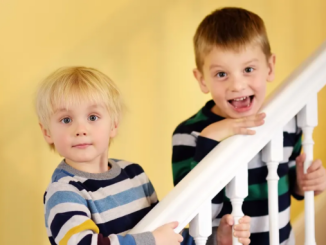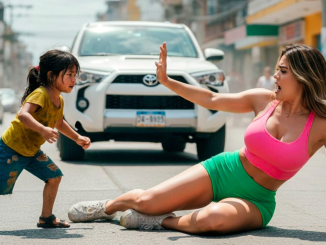
She looked so small in that hospital bed.
Not fragile, exactly—just… quieter than I remembered. The woman who once ran a household on black coffee and side-eyes now needed help sitting up. I brought her favorite slippers, the sparkly ones, and she smiled politely, but didn’t reach for them.
“Hi, Grandma,” I said, unsure if I should hug her or not. “It’s me. Mila.”
Her eyes blinked slowly, studying my face like she was looking through fog. For a second, I thought she didn’t know me.
Then she said one word:
“Chickpea.”
That was her nickname for me growing up. No one else knew it—not even my cousins. It was what she called me when we baked cookies or watched black-and-white movies on rainy days. “Chickpea, hand me that spoon.” “Chickpea, you missed a spot of flour on your nose.”
And just like that, I felt ten years old again.
I sat on the edge of the bed, blinking too fast, trying not to let the tears fall too obviously. She didn’t say much after that, but she didn’t need to.
She knew me.
And somehow, even with the machines, the meds, the memory loss they warned us about—she held onto that one soft piece of us.
So I stayed a little longer.
Read to her from her favorite garden book. Held her hand.
And as I tucked the blanket around her legs, she whispered:
“Next time, bring the lemon cookies.”
I smiled, blinking away a tear that had slipped down my cheek. The lemon cookies. I hadn’t made them in years, not since I was little. Grandma’s special recipe, the one with just the right amount of zest that made them irresistible.
“Next time,” I whispered, squeezing her hand. “I promise.”
It felt strange to leave, but I had to. The doctors had told us her condition was serious, that her health was declining rapidly. But for that brief moment, I felt like we’d shared something timeless, something more than just the space we were occupying in that sterile room. I felt her, truly, in a way I hadn’t in years. Like all the years of distance and growing up had melted away, and I was just Chickpea again.
On the drive home, I thought about the things I could do for her—how I could be there for her in ways I hadn’t been before. My life had been so busy with work, with trying to make a name for myself in the city, and with maintaining relationships that sometimes felt more like obligations. I had kept her at arm’s length, unintentionally. She always understood, but I could tell it hurt her. We were both stubborn in our own ways.
I hadn’t been the best granddaughter. I hadn’t kept in touch as often as I should have. There were times when she’d call, and I’d let it go to voicemail because I was “too busy.” Now, the guilt weighed heavily on me. What if I didn’t have much time left to make up for it?
The next few days were a blur. Work, phone calls, more visits to the hospital. Grandma’s condition seemed to worsen by the hour. The doctors were talking about hospice care, and I could see the toll it was taking on my mom and the rest of the family. But my focus was entirely on her—on Chickpea, and the woman who had shaped so many of my memories.
I made the lemon cookies.
The recipe was tucked away in the same old notebook I had found years ago, handwritten in her familiar script. The ingredients were simple enough, but it was the small, thoughtful details that I’d never quite understood as a child: the precise way to zest the lemons, the exact temperature of the oven, the special touch she added by rolling them in powdered sugar while they were still warm.
I spent the entire afternoon baking. As I pulled the golden cookies from the oven, my kitchen smelled like my childhood. It felt like I was back in that little house, helping Grandma roll out dough on the kitchen counter, laughing when I spilled flour everywhere, and begging her for the smallest taste of the batter.
That evening, I went back to the hospital with a small tin of cookies in hand. As soon as I entered her room, the familiar smell of antiseptic hit me, but it didn’t overpower the memories that flooded my senses. Grandma was asleep when I arrived, but I set the cookies on the bedside table anyway. I figured I could wait.
But a nurse came in shortly after, gently checking on her. She told me that Grandma had been more lucid that afternoon but had fallen into a deep sleep now. I stayed, holding the tin of cookies, not sure what to do with myself.
Then, just as I was about to leave, I heard a faint voice.
“Mila?”
I rushed to her side, my heart racing. “Grandma, it’s me. I brought the cookies—just like you asked.”
Her eyes opened slowly, but this time there was no fog. She recognized me immediately, and I could see a small spark of joy in her gaze. The same eyes that used to twinkle as she told me stories about the garden and her secret love for jazz music.
“Chickpea,” she whispered, a faint smile tugging at the corners of her lips. “You remembered.”
I nodded, wiping my eyes quickly before the tears could fall.
“I did. I remembered.”
She reached out with shaky hands and grabbed the tin of cookies from the table. With some effort, she sat up a little more in bed, and I helped her with a cookie. She smiled as she took a bite, her eyes lighting up as if she were tasting something she hadn’t had in ages.
I sat beside her, watching her savor the moment. It was funny how something so small—cookies, a shared memory—could make a moment feel so significant.
After a while, Grandma spoke again, her voice quieter now.
“Do you remember the garden, Mila? The one we planted together? The one with the lavender and roses?”
I nodded. “I remember. You always said it was your favorite place in the world.”
She smiled at that, the kind of smile that warmed the room despite the chill in the air. “I always thought I’d die there. Surrounded by the flowers I loved so much.”
I felt a lump in my throat. “Grandma… don’t say that.”
But she simply squeezed my hand. “I’m not afraid anymore, you know. I just want you to remember everything I taught you. About gardening, about life, about love.”
Her words hit me like a wave, pulling me into the depths of a truth I hadn’t been ready to face. She had always been so strong, so capable, and I had taken her presence for granted. All those years of visiting and thinking I had time—time to say more, time to do more.
I was losing her, and I hadn’t even realized how much I needed her until now.
That night, when I left the hospital, I carried her words with me. The next morning, I went straight to the garden she had always dreamed of, the one that had bloomed year after year because of her steady care. It was a place I hadn’t visited much in recent years, lost in the busyness of life. But that day, I stood among the flowers, breathing in the fresh air, and I felt her presence there more than ever.
I realized that she wasn’t just teaching me about plants. She was teaching me about patience, about cherishing the things that matter most. About taking the time to nourish the things that will last.
Grandma passed away quietly a week later, surrounded by family. But before she did, she said one last thing to me: “Don’t forget the lemon cookies, Chickpea.”
And I never will.
After her passing, I found a letter she had written to me years ago, hidden in one of her garden books. It wasn’t a goodbye letter. It was a letter full of advice. Full of hope. Full of the things she’d never had the chance to say aloud.
She had written, “Remember to take time for the things that matter. Family, love, and the quiet moments that make life beautiful. And never, ever forget that you have the power to grow something incredible, just like we did together in the garden.”
Those words became my guiding light. I started taking better care of the people I loved, started nurturing relationships that had withered in the shadows of my busy life. And as I did, I found that my own garden—my life—began to bloom again.
The lesson Grandma taught me wasn’t just about gardening. It was about slowing down, about noticing the things that truly matter, and taking the time to nourish them.
If you have someone you love, take the time to cherish them. Don’t wait for the perfect moment, because it might not come. Make those moments count now.
And remember: life, like a garden, needs care. Don’t forget to tend to it.
If this story resonates with you, please share it. Maybe someone else needs to hear it too.






Leave a Reply